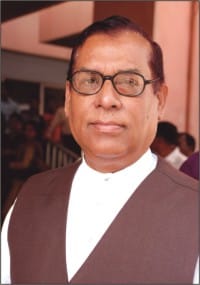TV icon on current state of the industry

“In most cases recruitment is not based on the background of the applicant; rather individuals are recruited according to the dictates of the owners. Nepotism is rampant and many people without any technical or aesthetic knowledge on programme-making are recruited.”
Former General Manager of BTV, Nawazish Ali Khan, is now the head of programmes of private TV channel ATN Bangla. Khan joined the then PTV in 1967. In his long innings as a producer for the public channel BTV, he has made many quality documentary and educational programmes and TV plays including the mega-popular sitcom Bahubrihi, written by Humayun Ahmed.
In a recent conversation with The Daily Star, Khan gave an update of the current scenario of the small screen industry in Bangladesh.
Going back in time, Khan pointed out that the boom in the TV medium was initiated at the start of the 21st century. A diversity of programmes -- TV plays, musical programmes, talk shows, news analyses, among others -- have gone on air on 11 private and one public channel. In the process, the industry has spawned many talents.
However, Khan says, most of the programmes are not up to scratch. He points an accusing finger at the government for giving the green light to so many TV channels.
In his words, "Since the mid 2000s the media boom gained a momentum; many private TV channels went on air without first verifying the market. During that period, politics dictated the allocation of licenses to many of these channels. However, the ad market is not big enough to cover so many channels. Many of these recent TV channels can't even pay the producers their dues."
"Even the budget for package programmes has been reduced because of the limited ad market. For this reason sometimes professionals don't get an adequate financial allocation to make quality programmes," he added.
Khan also attributes the declining standard of TV shows to the shortfall of qualified professionals. He said, "We face an acute shortage of talented playwrights, directors and actors in the country. Hence we see the same faces on different channels. Juggling multiple projects, busy artistes and technical hands can't invest their time to quality programmes that require focus."
Why don't we get diverse programmes apart from TV plays? Khan responds: "It's not true that diverse programmes are not aired; however, the number is insufficient. There are two reasons behind this. First of all, everyone wants shortcuts. It requires much table work and technical know how to make good documentaries and other offbeat programmes. The reality is that sponsors do not pay much for such programmes, and the makers of these shows don't get the kind of exposure TV play directors get.”
Sharing his personal experiences, Khan said, "During the early stages of my career I had a passion for making documentaries and educational programmes. Though I'd made several documentaries, hardly anyone can recall those. Most people remember Bahubrihi, a TV serial."
Regarding professionalism in the TV industry, Khan said, "I don't think this emergent industry has achieved professionalism in terms of recruitment, and to some extent in programme selection."
According to Khan, because of the flawed recruitment process most of the in-house programmes aired by the channels are not up to the mark. He said, “In most cases recruitment is not based on the background of the applicant; rather individuals are recruited according to the dictates of the owners. Nepotism is rampant and many people without any technical or aesthetic knowledge on programme-making are recruited."
However, what irks Khan the most is that some of the independent makers also do not have the required technical knowledge. According to him, “Sometimes they manipulate the management and bully them into airing substandard programmes. Another reason behind airing second-rate programmes is the influence of the sponsors. They prefer entertaining programmes, especially drama, featuring artistes of their choice."
Khan is less than impressed by the ongoing trend of mega-serials. "At least 10 mega-serials are aired each week on different channels. Most of these mega-serials are monotonous and mediocre," he observed.
Why are such shows aired then? Khan responded, “What usually happens is that renowned directors submit episodes of their shows to the preview committee and these look impressive. However, once the shows go on air, the makers fail to maintain the standard after 10/15 episodes. On top of that influential directors put pressure on the channels to continue airing these substandard mega-serials."
All is not lost, however. Khan emphasises on the need for a training institute in the country. As he asserted, “Professionals have to have both aesthetic and technical knowledge on programme making. Most of them learn on the job. In the absence of a training institute in Bangladesh, it is not possible to get qualified individuals working in the small screen industry.”
And despite all odds, Khan is optimistic about the long term potential of the industry.

 For all latest news, follow The Daily Star's Google News channel.
For all latest news, follow The Daily Star's Google News channel. 



Comments